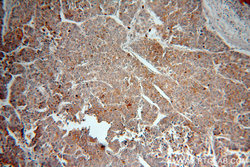Antibody data
- Antibody Data
- Antigen structure
- References [13]
- Comments [0]
- Validations
- Western blot [1]
- Immunohistochemistry [1]
Submit
Validation data
Reference
Comment
Report error
- Product number
- 13762-1-AP - Provider product page

- Provider
- Proteintech Group
- Proper citation
- Proteintech Cat#13762-1-AP, RRID:AB_10642007
- Product name
- AMBRA1 antibody
- Antibody type
- Polyclonal
- Description
- KD/KO validated AMBRA1 antibody (Cat. #13762-1-AP) is a rabbit polyclonal antibody that shows reactivity with human, mouse, rat and has been validated for the following applications: IF, IHC, WB,ELISA.
- Reactivity
- Human, Mouse, Rat
- Host
- Rabbit
- Conjugate
- Unconjugated
- Isotype
- IgG
- Vial size
- 20ul, 150ul
Submitted references AMBRA1 promotes intestinal inflammation by antagonizing PP4R1/PP4c mediated IKK dephosphorylation in an autophagy-independent manner.
Ambra1 in exosomes secreted by HK-2 cells damaged by supersaturated oxalate induce mitophagy and autophagy-ferroptosis in normal HK-2 cells to participate in the occurrence of kidney stones.
MiR-3653 blocks autophagy to inhibit epithelial-mesenchymal transition in breast cancer cells by targeting the autophagy-regulatory genes ATG12 and AMBRA1.
AMBRA1 attenuates the proliferation of uveal melanoma cells.
Shikonin induces apoptosis and autophagy via downregulation of pyrroline-5-carboxylate reductase1 in hepatocellular carcinoma cells.
Intron retention is a stress response in sensor genes and is restored by Japanese herbal medicines: A basis for future clinical applications.
Neuron-astrocyte transmitophagy is altered in Alzheimer's disease.
Autophagy-Related Genes and Long Noncoding RNAs Signatures as Predictive Biomarkers for Osteosarcoma Survival.
N-linoleyltyrosine exerts neuroprotective effects in APP/PS1 transgenic mice via cannabinoid receptor-mediated autophagy.
Selenoprotein S attenuates high glucose and/or ox-LDL-induced endothelium injury by regulating Akt/mTOR signaling and autophagy.
CRL4(AMBRA1) is a master regulator of D-type cyclins.
miR-103a-3p regulates mitophagy in Parkinson's disease through Parkin/Ambra1 signaling.
AMBRA1, a novel α-synuclein-binding protein, is implicated in the pathogenesis of multiple system atrophy.
Xu W, Hua Z, Wang Y, Tang W, Ou W, Liu F, Yang Y, Ding W, Wang Z, Cui L, Ge W, Gu Y, Wang X, Chen Y, Liu CY, Du P
Cell death and differentiation 2024 May;31(5):618-634
Cell death and differentiation 2024 May;31(5):618-634
Ambra1 in exosomes secreted by HK-2 cells damaged by supersaturated oxalate induce mitophagy and autophagy-ferroptosis in normal HK-2 cells to participate in the occurrence of kidney stones.
Su X, Song C, He Z, Song Q, Meng L, Dong C, Zhou J, Ke H, Xiong Y, Liu J, Liao W, Yang S
Biochimica et biophysica acta. Molecular cell research 2024 Jan;1871(1):119604
Biochimica et biophysica acta. Molecular cell research 2024 Jan;1871(1):119604
MiR-3653 blocks autophagy to inhibit epithelial-mesenchymal transition in breast cancer cells by targeting the autophagy-regulatory genes ATG12 and AMBRA1.
Song H, Zhao Z, Ma L, Zhang B, Song Y
Chinese medical journal 2023 Sep 5;136(17):2086-2100
Chinese medical journal 2023 Sep 5;136(17):2086-2100
AMBRA1 attenuates the proliferation of uveal melanoma cells.
Zhao B, Yang Y, Cun B, Chen P
Open medicine (Warsaw, Poland) 2022;17(1):1-14
Open medicine (Warsaw, Poland) 2022;17(1):1-14
Shikonin induces apoptosis and autophagy via downregulation of pyrroline-5-carboxylate reductase1 in hepatocellular carcinoma cells.
Zhang J, Shang L, Jiang W, Wu W
Bioengineered 2022 Mar;13(3):7904-7918
Bioengineered 2022 Mar;13(3):7904-7918
Intron retention is a stress response in sensor genes and is restored by Japanese herbal medicines: A basis for future clinical applications.
Vu TD, Ito N, Oshima K, Maruko A, Nishi A, Mizoguchi K, Odaguchi H, Kobayashi Y, Okada N
Gene 2022 Jul 1;830:146496
Gene 2022 Jul 1;830:146496
Neuron-astrocyte transmitophagy is altered in Alzheimer's disease.
Lampinen R, Belaya I, Saveleva L, Liddell JR, Rait D, Huuskonen MT, Giniatullina R, Sorvari A, Soppela L, Mikhailov N, Boccuni I, Giniatullin R, Cruz-Haces M, Konovalova J, Koskuvi M, Domanskyi A, Hämäläinen RH, Goldsteins G, Koistinaho J, Malm T, Chew S, Rilla K, White AR, Marsh-Armstrong N, Kanninen KM
Neurobiology of disease 2022 Aug;170:105753
Neurobiology of disease 2022 Aug;170:105753
Autophagy-Related Genes and Long Noncoding RNAs Signatures as Predictive Biomarkers for Osteosarcoma Survival.
Zhang J, Ding R, Wu T, Jia J, Cheng X
Frontiers in cell and developmental biology 2021;9:705291
Frontiers in cell and developmental biology 2021;9:705291
N-linoleyltyrosine exerts neuroprotective effects in APP/PS1 transgenic mice via cannabinoid receptor-mediated autophagy.
Long CM, Zheng QX, Zhou Y, Liu YT, Gong LP, Zeng YC, Liu S
Journal of pharmacological sciences 2021 Dec;147(4):315-324
Journal of pharmacological sciences 2021 Dec;147(4):315-324
Selenoprotein S attenuates high glucose and/or ox-LDL-induced endothelium injury by regulating Akt/mTOR signaling and autophagy.
Wang Z, Li Y, Yao J, Yu S, Yu H, Men L, Du J
The international journal of biochemistry & cell biology 2021 Dec;141:106111
The international journal of biochemistry & cell biology 2021 Dec;141:106111
CRL4(AMBRA1) is a master regulator of D-type cyclins.
Simoneschi D, Rona G, Zhou N, Jeong YT, Jiang S, Milletti G, Arbini AA, O'Sullivan A, Wang AA, Nithikasem S, Keegan S, Siu Y, Cianfanelli V, Maiani E, Nazio F, Cecconi F, Boccalatte F, Fenyö D, Jones DR, Busino L, Pagano M
Nature 2021 Apr;592(7856):789-793
Nature 2021 Apr;592(7856):789-793
miR-103a-3p regulates mitophagy in Parkinson's disease through Parkin/Ambra1 signaling.
Zhou J, Zhao Y, Li Z, Zhu M, Wang Z, Li Y, Xu T, Feng D, Zhang S, Tang F, Yao J
Pharmacological research 2020 Oct;160:105197
Pharmacological research 2020 Oct;160:105197
AMBRA1, a novel α-synuclein-binding protein, is implicated in the pathogenesis of multiple system atrophy.
Miki Y, Tanji K, Mori F, Tatara Y, Utsumi J, Sasaki H, Kakita A, Takahashi H, Fimia GM, Wakabayashi K
Brain pathology (Zurich, Switzerland) 2018 Jan;28(1):28-42
Brain pathology (Zurich, Switzerland) 2018 Jan;28(1):28-42
No comments: Submit comment
Supportive validation
- Submitted by
- Proteintech Group (provider)
- Main image

- Experimental details
- mouse brain tissue were subjected to SDS PAGE followed by western blot with 13762-1-AP(AMBRA1 antibody) at dilution of 1:300
- Sample type
- tissue
Supportive validation
- Submitted by
- Proteintech Group (provider)
- Main image

- Experimental details
- The AMBRA1 antibody from Proteintech is a rabbit polyclonal antibody to a recombinant protein of human AMBRA1. This antibody recognizes human,mouse,rat antigen. The AMBRA1 antibody has been validated for the following applications: ELISA, IHC, WB analysis.
 Explore
Explore Validate
Validate Learn
Learn Western blot
Western blot ELISA
ELISA